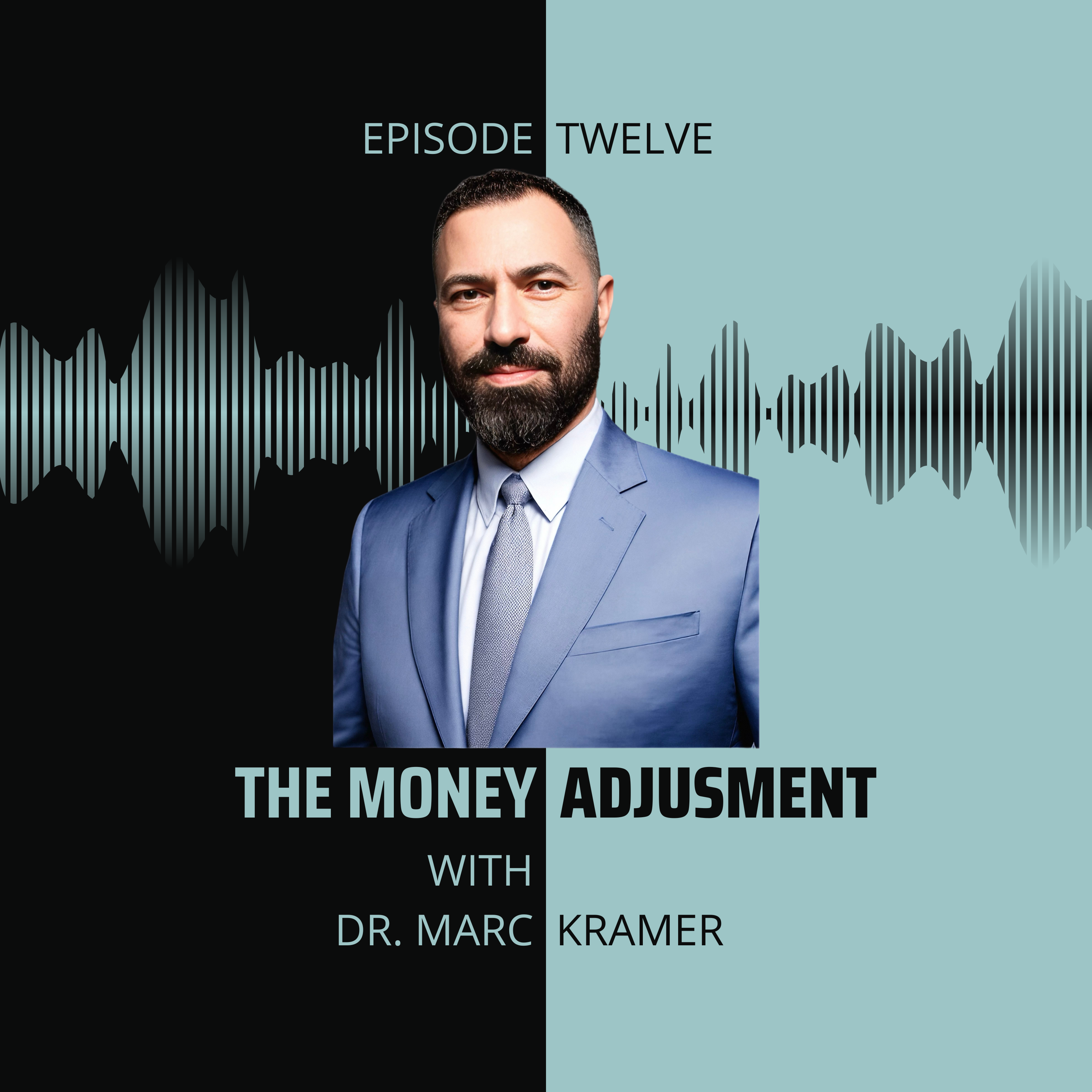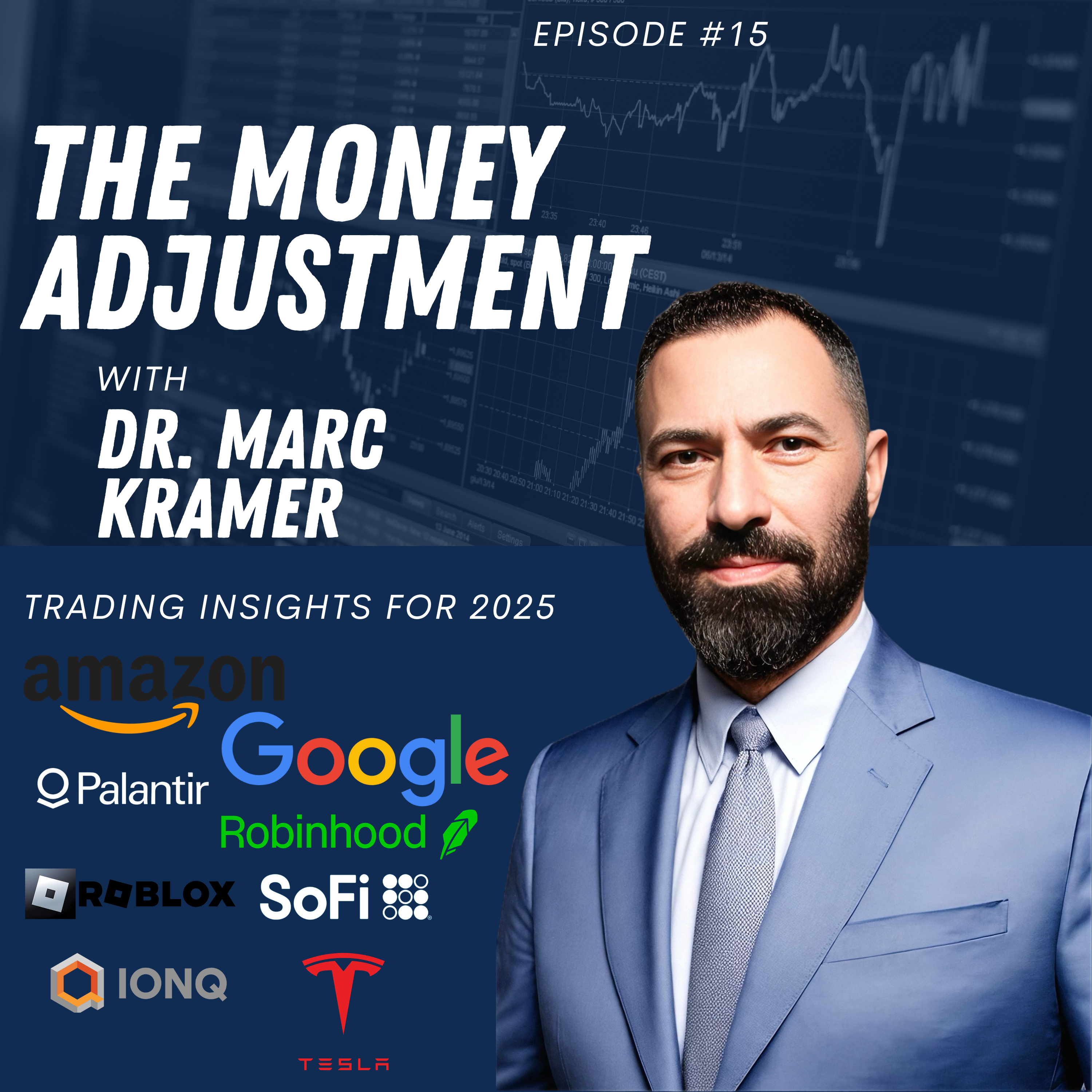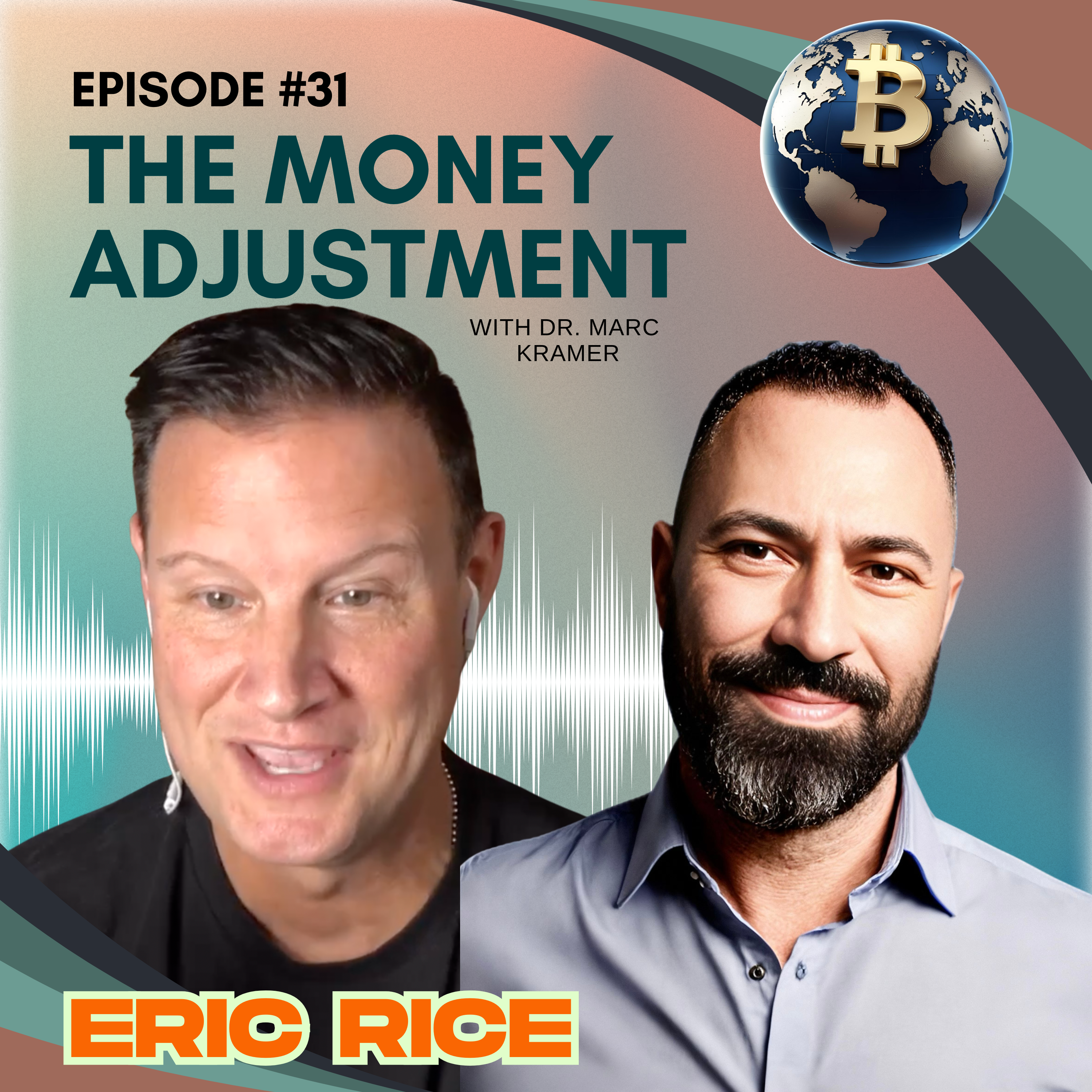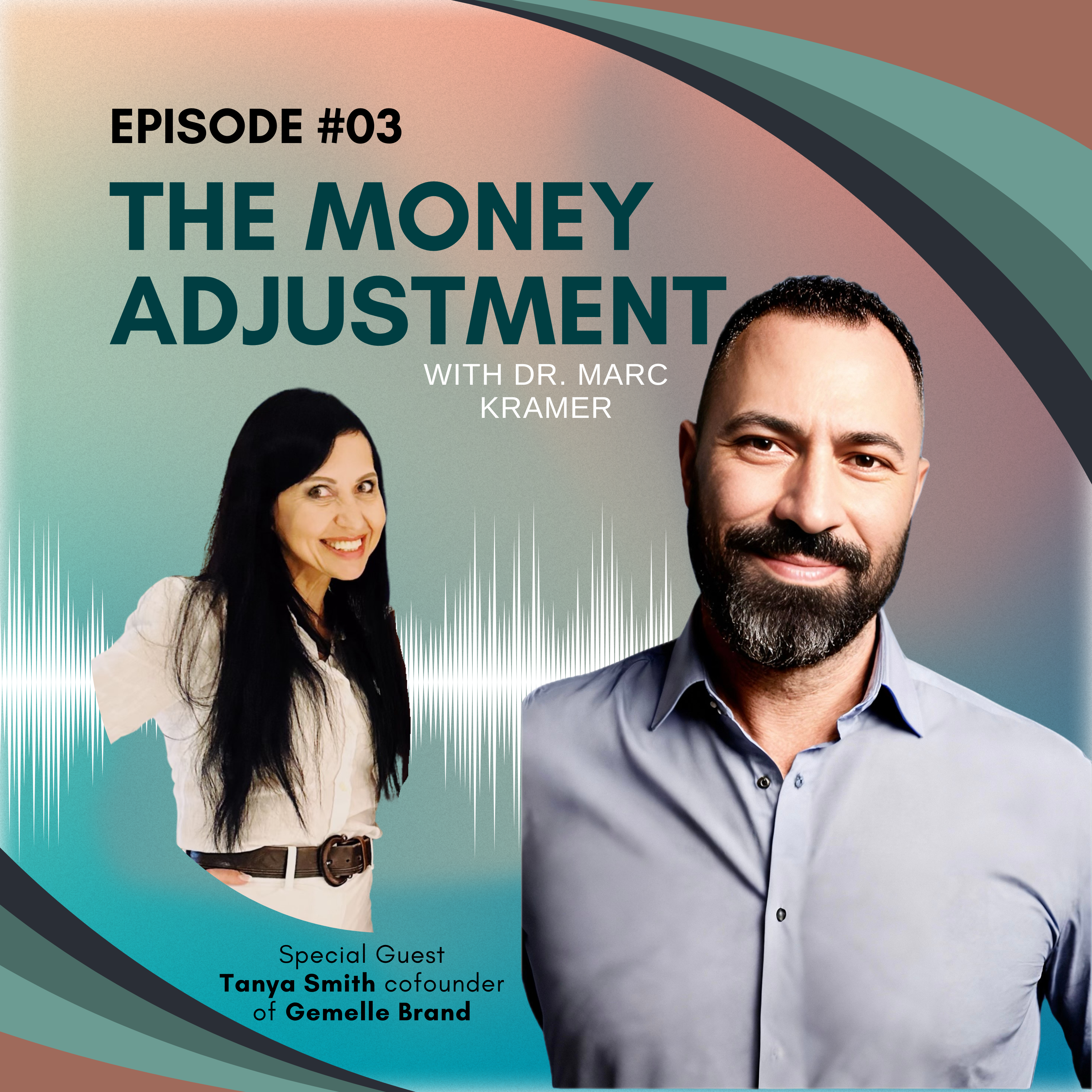Episode Transcript
[00:00:02] Hello, welcome to the Money Adjustment. I'm your host, Dr. Mark Kramer. I am a chiropractor who loves investing and trading. Are you interested in what's moving markets and your money?
[00:00:15] Great. Me too. Let's get started.
[00:00:19] When I was studying to be an artist, a creative type person, whether it be in writing, actually it would be in writing. That was the main thing. I thought I would have the most opportunity to be creative. Wrote a lot of short stories and poems. I had a very small, tiny bit of acclaim for some poems for a couple years that I had written on X, formerly known as Twitter. Outside of that, I don't have anything published. I am not recognized for any of my writing outside of the medical community and courts of law.
[00:01:00] And even then I'm a ghostwriter more than anything. During that period of time I read a book called the Artist's Way. One of the things I recall from that book is writing down your thoughts the first thing when you get up in the morning. The exercise is called Morning Pages. The idea is that once you start getting your thoughts out on paper, then it's like running a faucet. The faucet may start to drip at first, but as as time goes on, the water comes out more readily. So I'm going to attempt a morning pages style podcast. For this particular episode, I had done some AI workups and some preparatory work and a list of things that I was doing or wanted to discuss during this particular episode. As I was reading through it and revising it, I honestly lost interest in the whole exercise. I am more of a prancer than a planner if you don't know what those terms are and writing a prancer is someone who just writes freely and then see where the story takes them. And a planner is someone that outlines what they are about to write and gives structure to their work before they do it. So most people are probably some combination of both, and there's certainly value in both. But in an effort to be honest to myself, I am much more strongly a prancer. And if I waited for the planning part of everything, I probably wouldn't get through much in my day. So the pros of prancing is that I can at least get my thoughts out of my head and be able to share them with you. The downside to prancing is that sometimes there might not be a full coherent story or I may go off tangent. I will try my best not to do that, but I've been putting off this particular podcast episode for a little while now and I thought, you know what? Let's just hit record and start talking and see what happens. Because this is not an episode or a podcast on being an artist or a creative in general. This is a podcast about money.
[00:03:32] It would be worthwhile for me to talk to you about things related to money.
[00:03:38] Now, I've been doing a lot of trading and technical analysis videos. I've been doing interview videos, podcasts. I've been enjoying those. But I'm taking a small break from the interviewing and collecting my thoughts in terms of where I want to go with this podcast series.
[00:03:59] Now, I say serious because at the beginning of the year, I committed to doing 21 podcast episodes. This was before I even had a single podcast episode out. I had been trying to get together a podcast for a number of months. One of the people I enlisted was my uncle, who is a retired actor, and he once had a podcast.
[00:04:29] So I thought he would be a good person to riff off of with, and I enjoyed talking to him. So he and I would schedule a call once a week and we would just talk about events in the news and what was on our mind. That was fun. But I didn't, at the end of those calls, have anything I could really publish. And at that point, I had no form of distribution, and I just really didn't know what I didn't know. So in the Latter Part of 2023, I hired a podcast coach, and that coach and his team helped me get clear on what I might have to offer through a podcast. And the niche audience that I was trying to reach. That audience turns out to be investors and traders. I am personally an investor and a trader. There's a lot of ways to do this. I watch YouTube videos, and I have a lot of people on YouTube that I follow are really good about the type of videos they produce. They're very high quality and show lots of bars and charts and graphs. And some of them are very forthright in terms of the numbers in their portfolio.
[00:05:45] And they're quite impressive because they're young, too. So I don't think I'm really reaching that audience per se thus far. It seems like my demographic is somewhere between the ages of 35 and 50, and that's probably because that is the demographic I am currently in. And at the latter part of that being said, I think about my friends, the people that I grew up with, my Gen Xers in particular, and when we hear things like millions of dollars in revenue, or let's say, like millions of dollars in monthly revenue, that may seem absurd to us.
[00:06:29] Why? Because a lot of us were still groomed to save in our retirement accounts, our 401ks, our Roth IRAs, and we were told to put aside our money, be diligent at our jobs, and after 30 plus years, if we were fortunate, we would have enough money in our accounts to retire and live off of. And most of my friends are still operating from that mindset. I have one friend who recently retired. He had a business that he inherited, but he also worked in that business and helped it to grow and grew it to the point where he's able to sell it and walked away with a nice bit of change from that, from that investment, his investment in his business. He admittedly said that because he invested so much in his business that he didn't quite have the same appreciation for other types of investment like the stock market or real estate, let's say. So that's when he and I had a brief communication online and he asked my opinion on a few things because he saw that I was interested in investing and that may or may not be the type of person that I'm trying to reach. I'm still trying to get clear for myself who my target audience is, even after all this time. I know it's been a year and I'm getting kind of old and starting out in the podcast space. This is arguably a younger person's game. But if you listen to Gary Vee, he'll tell you that people in their 60s and 70s should start doing podcasts because there's a wealth of wisdom into knowledge there that's untapped. And the thing that probably prohibits a lot of older people from doing this is because of the technology and maybe not understanding the intricacies of posting and particularly getting a podcast out or YouTube video or things of that nature. I am probably in that latter category. I've certainly had friends, especially my chiropractic friends, who have been watching for years very actively post on social media, including videos. And they've been doing what I've been doing or what I'm doing right now, for years and years and years. I think I came into this a little bit later for a couple reasons. When I was in my early 30s and getting started in practice and social media was coming of age, let's say around 2010, I had my own practice in Los Angeles, California. I practiced in Beverly Hills. I also practiced in West Hollywood, and West Hollywood is actually where I had my own practice. During that time.
[00:09:26] I had a website, I was aggressively marketing on social media, and I even did Some paid advertisement at one point through Facebook Meta, formerly known as Facebook at that time, when I started paying Facebook for advertising, it was at that moment I was like, man, I need to figure out how to invest in this company. It was not at that point publicly traded. And prior to me spending money on paid advertisement, Facebook was just really unknown to a lot of people outside of maybe Silicon Valley and college students at that point. I had graduated from chiropractic school actually. Facebook, I believe was founded in 2004. I graduated from chiropractic school in 2004. Facebook at the time was just like fancy texting. And six years later, by 2010, Facebook had its initial public offering. It was around that time that I was spending money on paid advertising and I was thinking, wow, I need to invest in this company. So I had some experience in investing even prior to that, I should say more trading. And that was back way back in the 90s, in the late 90s when I was in college, my roommates were engineers. Yahoo and MetaCrawler were popular search engines at the time. Even just the concept of the Internet was becoming a broader topic of conversation. And there was still not the ubiquitous exposure that there certainly is today. Seeing at that time. Laptop computers with the intel logo on them. And some things I had heard from my friends in engineering caused me to believe that intel was a good investment in the 90s. It really was actually. And I wound up opening a brokerage I don't even remember with whom. I remember buying maybe like 10 shares of intel and making a few hundred dollars. And at some point that account got closed. I took my money and I haven't looked back at intel, which is if you follow the stock market. Now, intel is not the stock it once was.
[00:11:46] But this isn't about Intel. This is just kind of my personal story in terms of why I am interested in the stock market in the first place. Flashback also to about the 90s. After I graduated from college, my grandmother, who is one of my role models, earlier role models when it came to investing because she was an active investor and she went to a lot of. I remember her taking me to different sales pitches for different types of investments. My grandmother actually did well from investing. She, she was also a gambler. She dealt cards. She lived in Las Vegas and the latter part of her life she was a card dealer. She loved to play Texas Hold Em. She did that for most of her still competent years until she later on went into assisted living. And that's like its own story.
[00:12:43] So maybe there's somewhere in the blood, a little bit of a taste for investing, trading and taking on a bit of risk. Flash forward to March of 2020, I, like many other people like the globe, basically found themselves on lockdown. I had already been working remotely from home for a number of years since 2014, so that remote situation didn't change much for me. What changed was that everybody was home and that wasn't used to everybody being home. Also at the same time when I was home, my son, who was in kindergarten at the time and didn't know how to use a computer, was having learn a computer and figure things out at a rapid pace because of the circumstances. I know for patients, for parents who are in that situation at that time period, you know what I'm talking about, that was interesting. But what I did, what changed for me was In March of 2020, I was watching CNBC and I saw this incredible drawdown in the market that I had not seen before in my time of watching the market, which I had varying levels of interest from let's say, 2010 to 2014. In 2014, I had increased levels of interest, started reading books. William O'Neill was one person that I read Investors Business Daily, if anybody's familiar with that. Anyways, I read a lot of books on investing, but I still wasn't committed to the level and extent I am now. I just bought an ETF, the QQQS, which at that time I think I bought like five shares for. At the time I think it was like 150, 50 bucks or something. And as of late they've been trading in the $500 level. So just that simple. Buy and hold. You can see incredible returns. My position sizing was small, so it didn't really make that much of a difference in my portfolio. But In March of 2020, the stock market crashed and it rolled back five years, meaning that most stocks went back to prices they were selling at five years prior. And if you watch those stocks go up for five years and just go up and up and up, you felt like you missed something. It was all of a sudden an opportunity for redemption. And certainly I wasn't the only person who felt like that because March of 2020 was the low and stocks have pretty much done nothing but go up since then. Now, there's a caveat to that. From 2022 to 2023, there was a correction, a significant correction, and a decent bear market. For the.
[00:15:32] So for context, I had made hundreds of thousands of dollars in the stock market from 2020. From 2020 to 2022. And in all honesty, I gave most of that back from the latter two years. The reasoning for that was it was interesting. Could have been worse. Actually, it could have been much worse. But I did recognize, and I do recall the pundits on CNBC saying that these new investors, and though I wasn, I hadn't committed to the market like I had during the years after 2020.
[00:16:11] But the pundits were saying how the new investors hadn't seen a tightening cycle. And then there was just this emphasis on the rate hiking that the Fed eventually wound up going through. And it was the fastest rate hike in history.
[00:16:29] And so myself, like a lot of other investors, took quite a bit of a spank, especially the noobs. So it was probably enough to shake out a lot of people that weren't serious about the stock market. I'm happy to say that I've recovered decently from that period. I still feel like I'm always learning. But I think what happens is I've talked to a lot of my friends and my friends who also played around in the stock market during that time. Certain friends said that they lost money and they never were going to do stocks again. And I think that's one thing you hear a lot because you've lost money, you don't want to take the risk, especially in the stock market. And then a lot of people, and this is like entrepreneurial people, I'm finding, which is fascinating to me, because they just think about money differently than an investor thinks about money. Entrepreneurs are thinking about revenue and how much money they can bring in every month. And they're measuring their performance by an investor is measuring their performance by profit and loss. An investor is caring about how much of a return can they get on the capital that they're allocating towards a specific asset. So that's where I'm kind of finding myself these days, is bouncing around between business owners and investors and just people who like to talk about money. And if I go a little bit deeper into my life, my mother invested in real estate. I saw her most weekends looking through the paper and just seeing what real estate was selling.
[00:18:10] But I never felt particularly wealthy. My parents were definitely a middle class family. My parents drove used cars. I was an only child, so I was spoiled in that way. But my mom was from Iran and she was older and she was raised in Iran during their depression. So even though I was a kid of the 80s, my mom was a product of a depression era from her country. So that mentality I think kind of was instilled in me in some ways. So I've kind of felt a certain type of fear maybe associated around money, because I picked that up from my mom, may she rest in peace. But my mom was also a really good investor. She took what limited resources we had, and she purchased a few single family homes and she had a rental property, and she did some investing in the stock market. Upon my parents passing, I realized that they were very conservative investors. They had one stock that I can even remember, and that was Verizon. And Verizon is just a steady eddy kind of stock, and it paid dividends. So I'm assuming that's why my parents were invested in that one.
[00:19:33] So I kind of have a mixed background with regards to how I came of age and how I got interested in investing in the stock market.
[00:19:44] My grandmother was an influence. My mother was another influence. When my mom was still alive, some of the most intense conversations that we had, as is normal with a lot of people, were around money. And there's a certain aliveness that happens when you're talking about money, because money's a sensitive issue for people. Even if you have a ton of money, you still have to know what to do with it, because if you make a lot of money, you are probably wise enough not to spend it all, but then you have to allocate what you made into something else that's going to protect you, hopefully down the road. So there is this fluctuation between risk on and risk off. There's different ways of thinking about money. It's these experiences that I've had growing up, up with the stock market. And key moments, like I was saying in the 90s with intel, and then in the mid-2000s with Facebook, and then March of 2020, where I just really went all in. I haven't looked back since March of 2020. Even with the bear market, I just suffered it like a lot of people had to. And I'm still in the game. I have not, not given up. And this year I've seen, I would say, over a 50% return on the largest portfolio that I manage. I could get into numbers, but honestly, I think my numbers wouldn't impress very many people, and they would probably just be on par with a lot of people my age. And maybe to some people, they would see it as a lot. It's all relative. So, yeah, I think it's better to think about these things in terms of percentages and what. What you want to accomplish with your own finances and your resources and the way that you're thinking about it.
[00:21:34] So I guess kind of going back to who my ideal audience would be is somebody that is managing their own money and has maybe at least some knowledge or at least some interest in the stock market. And then I am on my learning curve for real estate because I've managed property in the past.
[00:21:57] I've had to deal with my parents properties and the single family home thing never really appealed to me and I didn't know why until recently. And now I'm learning things where I'm seeing advantages to multifamily units and a lot of opportunities there. But just like with the stock market, I think it's going to take a while for me to embrace real estate.
[00:22:23] I also have Alex Hormozi's voice in my head. And for those of you who don't know, Alex Hermozy is kind of a breakout guru of the last couple of years. He started a company called Gym Launch and he was backgrounds in personal training and then he launched Gyms. And so he's made millions of dollars and he sold his company for $50 million. And then he's now branding himself as a business person, which he is. His newest company is acquisition.com but the reason I was thinking about him is because his big tenet is to focus and he's, he's aimed towards younger people. So he's not really talking to my age group per se. But if you're a business owner then you could still fit into his funnel. He was saying how you need to focus on something. It's funny because I'm a chiropractor, I think I would just focus on health. But my chiropractic friends out there, not to call out the profession, but you know what the margins are on a chiropractic adjustment.
[00:23:23] I hope that comment doesn't bite me in the butt. But you have to know your market market and you have to know your interests and you have to focus on something. So I probably would be better off maybe just focusing on the stock market, but I do feel like real estate offers some advantages that the stock market does not offer. I'm learning more about that. And so the broader category would just be investing in general and managing money.
[00:23:51] Whether you have a lot of money or a little money, you have to know what to do with it. That is what I am trying to do with this podcast is figure out what is going to be helpful to grow your wealth. I'm figuring this out for myself and I'm going to be figuring this out with anybody that is interested in engaging with me on the subject. I appreciate you listening to this episode. We'll get back to some regularly scheduled programming soon. Have a great day, week, month, year life, and we'll see you guys on the next one. Bye.
[00:24:31] Thank you for listening to this episode of the Money Adjustment. If you found value like comment and subscribe, follow me on X Mark Kramer I look forward to being with you on the next episode. Until then, stay healthy and wealthy.



